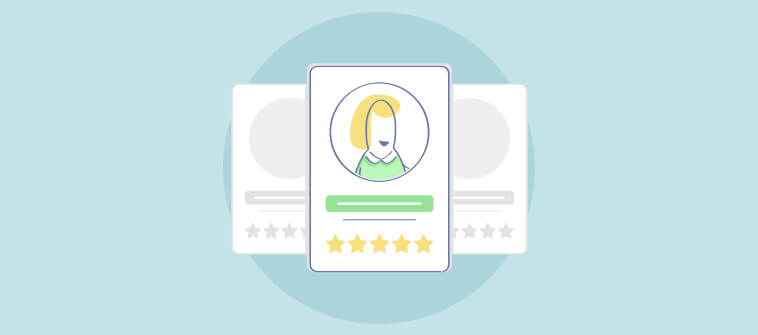Did you know the help desk software market is set to hit a whopping $21.8 billion by 2027? That’s a giant leap, and it’s no surprise—businesses increasingly rely on cutting-edge tools to upgrade customer support.
Whether you want to improve communication, automate tasks, or boost customer satisfaction, the right help desk software can make it a reality.
In this detailed guide, I’ll share the 12 best help desk software solutions, designed to upgrade your customer support and boost your bottom line. Whether you’re a small startup or an established enterprise, I’ve got you covered!
What Is Help Desk Software?
Help desk software is a tool designed to assist businesses in managing and resolving customer support issues efficiently. It enables businesses to track, prioritize, and respond to customer inquiries, ensuring no issue goes unresolved. By centralizing communication, it helps streamline customer service workflows.
This software typically includes features like ticket management, knowledge bases, and canned responses. With ticketing systems, businesses can assign, categorize, and monitor support tickets, ensuring a structured approach to customer issues. The software may also integrate with other platforms like live chat or email for seamless communication.
Help desk software improves response times, boosts customer satisfaction, and enhances team collaboration. It often provides reporting and analytics, allowing businesses to measure performance and identify areas for improvement. Ultimately, it helps businesses offer high-quality, responsive service while keeping operations running smoothly and efficiently.
Now, let’s take a quick glance at the 12 best helpdesk software featured in this blog.
| Help Desk Software | Best for | Pricing |
|---|---|---|
| ProProfs Help Desk | AI Help Desk & Support Ticketing for Customer Delight | FREE for a single user. Plans start at $19.99/user/month for 2 or more users. |
| SolarWinds Service Desk | Asset Management | Starts at $39/user/month. |
| HubSpot Service Hub | Customer Portal | Starts at $15/user/month. |
| Zendesk | Self-Service | Starts at $55/user/month. |
| Freshdesk | Omnichannel Support | Starts at $15/user/month. |
| Zoho Desk | Social Media Service | Starts at $14/user/month. |
| Azuredesk | An Unlimited Mailbox | Starts at $33/user/month. |
| Vision Helpdesk | Mobile Application | Starts at $12/user/month. |
| TeamSupport | B2B Ticketing System Software | Starts at $29/user/month. |
| Deskpro | On-Premise Deployment | The cloud version starts at $29/user/month. Custom pricing is offered for the on-premise version. |
| Help Scout | Live Chat Support | Starts at $22/user/month. |
| LiveAgent | Ticket Management | Starts at $9/user/month. |
Spotlight on the Top 3 Help Desk Software: A Quick Overview
To help you make the best choice, here are my top 3 recommendations:
Option A: ProProfs Help Desk
ProProfs Help Desk is a powerful help desk software that streamlines ticket management, boosts agent productivity, and centralizes customer emails. Its AI-driven features, automated ticket assignments, and tool integrations make it an excellent choice for efficient customer support.
Option B: HubSpot Service Hub
HubSpot Service Hub offers a customer portal for seamless interaction, allowing users to track requests and communicate in real-time. Its conversational inbox consolidates all channels into one view, while productivity tools like canned responses and live chat enhance efficiency.
Option C: Help Scout
Help Scout is an excellent customer support tool with a well-organized shared inbox for easy collaboration. Its live chat feature allows proactive engagement, while the knowledge base empowers customers to find answers independently, reducing ticket volume and improving efficiency.
List of Top 12 Help Desk Software in 2025
I’ve done thorough research to bring you a list of the best help desk tools. Let’s take a closer look at each tool’s unique features, benefits, drawbacks, and pricing.
1. ProProfs Help Desk – Best for AI Help Desk & Support Ticketing for Customer Delight
ProProfs Desk is help desk software that streamlines ticket management, improves agent efficiency, and delivers delightful customer support. It allows you to manage tickets seamlessly and access and manage all your customer-facing emails on a single dashboard. You can also integrate your help desk with your favorite tools, such as Knowledge Base, Live Chat, MS Dynamics, and Salesforce.
I was particularly impressed by the AI-powered help desk features, such as the AI ticket summarization and response suggestions. These features save me time and help me provide accurate and timely customer support. The automated ticket escalation is also a great feature, ensuring that urgent issues are prioritized and resolved quickly.
Overall, ProProfs Desk is a valuable tool for improving my productivity and delivering exceptional customer service. I highly recommend it to any business looking for a robust, intelligent help desk solution.
What You’ll Like:
- Internal notes to seek advice and discuss complex issues with team members
- Agent roles and permissions to restrict access to the help desk system
- AI-powered response suggestions for faster replies
- Track ticket response time, resolution time, agent ratings, and other help desk metrics
What You Won’t Like:
- A wide array of features can be overwhelming for some users
- Channel-specific reporting metrics should be added for better insights
Pricing:
- FREE for a single user. Plans start at $19.99/user/month for 2 or more users.
2. SolarWinds Service Desk – Best for Asset Management
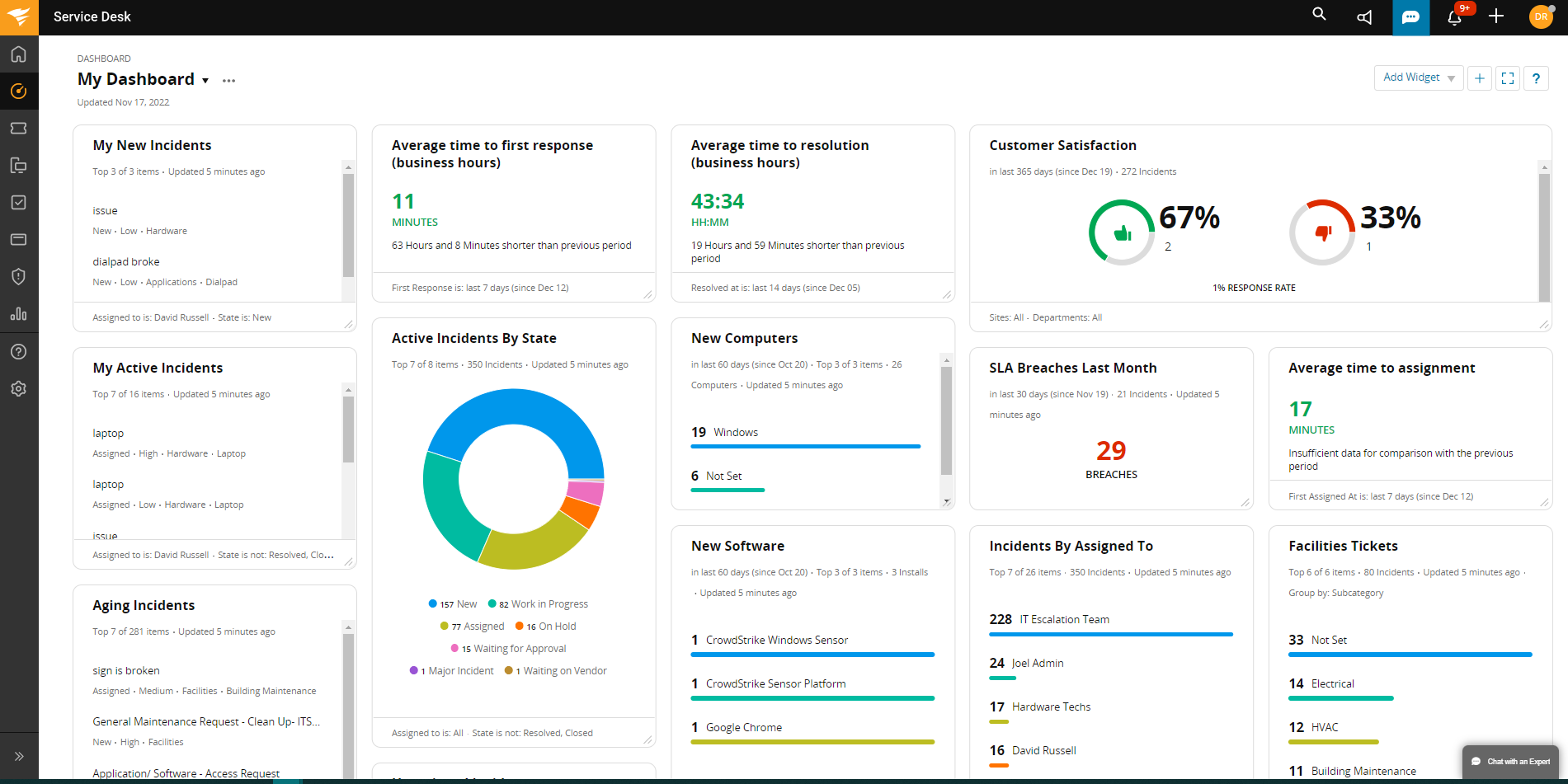
Image Source: G2
SolarWinds Service Desk is a comprehensive IT service management solution with robust features. If you ask me, my favorite is the IT asset management feature that helped us streamline inventory control, offering us insights into hardware and software assets in usage throughout the company.
The tool also allows businesses to set up a knowledge base quickly. Whether it’s your internal employees or customers, you can empower end-users with self-help resources, reducing support ticket volume.
On the downside, I find the user interface a bit outdated. If you’re looking for help desk software with a modern, visually appealing design, SolarWinds Service Desk might not be the best fit.
What You’ll Like:
- Service catalog to display all the services on offer
- Custom roles to determine who can access what features in the help desk system
- Schedule reports to receive them directly in your inbox
- Multi-factor authentication (MFA) to maximize data security
What You Won’t Like:
- The UI seems quite outdated and needs improvement
- The company should offer more support materials like video tutorials to assist first-time users
Pricing:
- Starts at $39/user/month.
3. HubSpot Service Hub – Best for Customer Portal
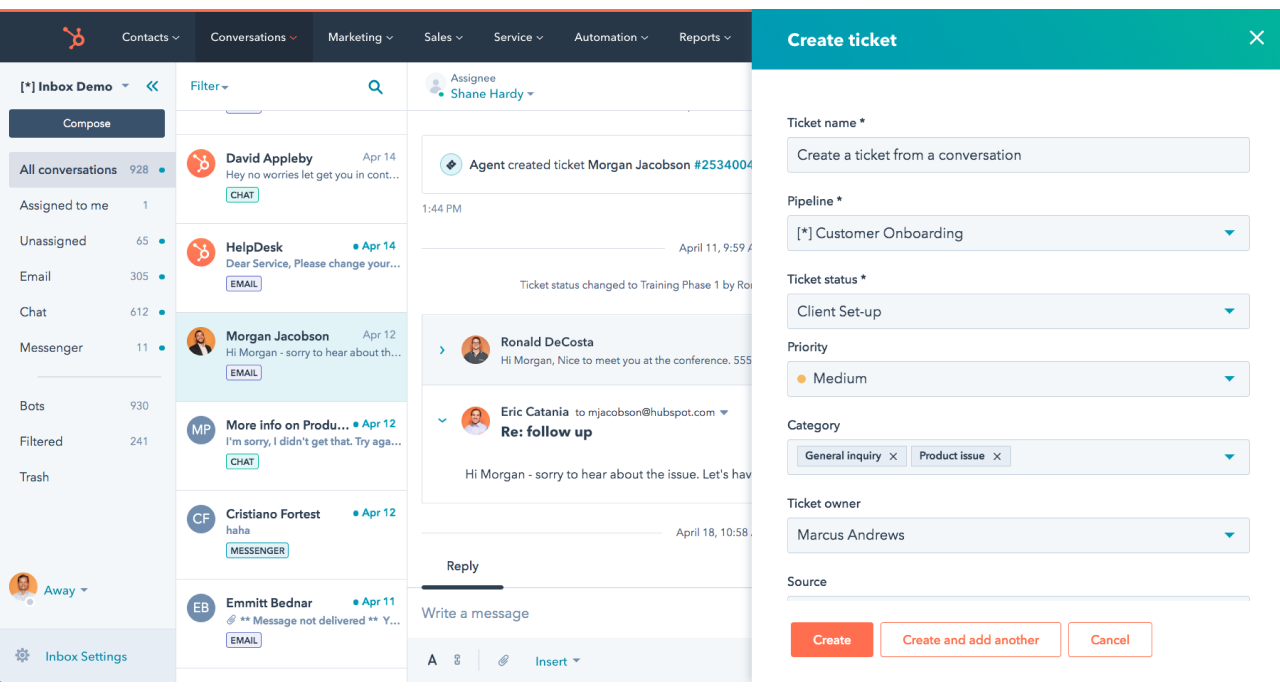
Image Source: HubSpot Service Hub
HubSpot Service Hub has taken our customer support to the next level. Its customer portal feature empowers businesses by providing customers with a centralized platform for seamless interaction. Customers can track support requests, access the knowledge base, and communicate in real-time with personalized access.
I also liked its conversational inbox feature, which consolidates all communication channels into a single, streamlined view. No more jumping between different platforms! This, combined with the productivity tools like canned responses and saved views, allowed me to resolve issues quickly and efficiently.
Also, the live chat feature allows you to route support inquiries and lead to the right agents or departments. This helps you give adequate attention to each website visitor.
What You’ll Like:
- HubSpot CRM integration to access all important customer information in one place
- CSAT and NPS surveys to capture customer service feedback
- Multiple integration options with Mailchimp, Aircall, Google Contacts, etc
- Shared inbox to centralize all inquiries in one place
What You Won’t Like:
- HubSpot Service Hub’s subscription plans are quite expensive
- The Single Sign-on feature is only available in the Enterprise Plan
Pricing:
- Starts at $15/user/month.
4. Zendesk – Best for Self-Service
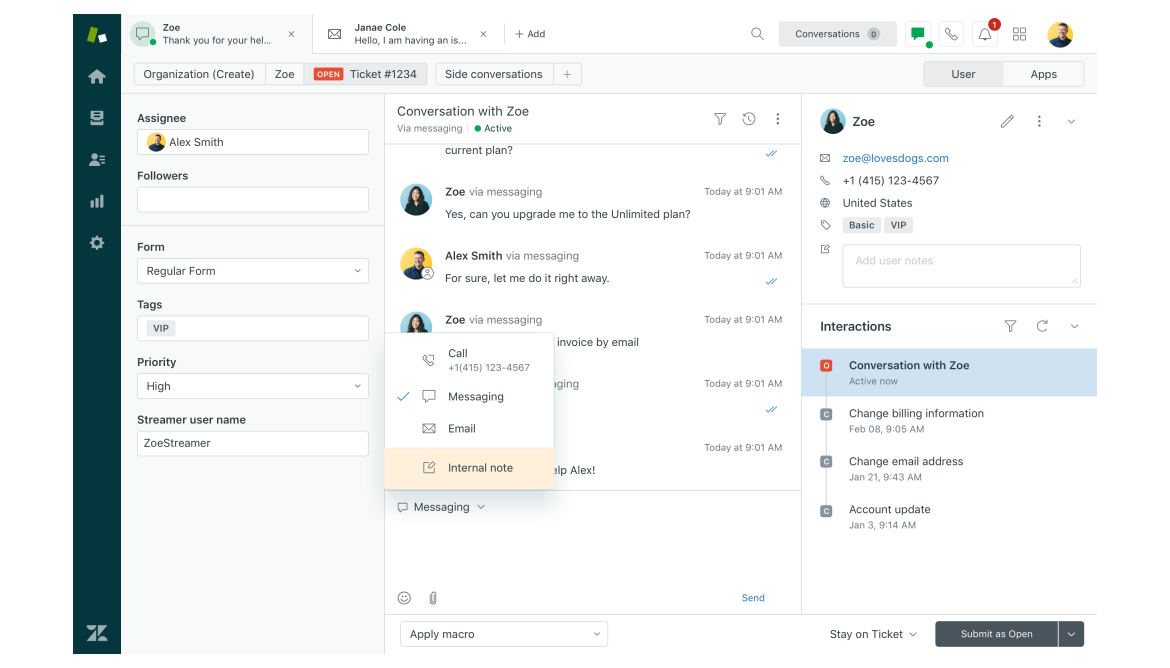
Image Source: Getvoip.com
While looking for a help desk solution to reduce my ticket volume, a close friend recommended Zendesk, and I was quickly impressed by its self-service features. With an online knowledge base, customers can easily find answers in FAQs, articles, or video tutorials, allowing agents to focus on high-priority needs and improve the experience.
Another aspect I find valuable is Zendesk’s focus on customization. It allows you to tailor the platform to your specific needs, whether it’s creating custom ticket forms, setting up automated workflows, or branding the customer portal. This flexibility ensures that you can deliver a consistent and personalized support experience.
Plus, Zendesk’s reporting and analytics capabilities provided valuable insights into my team’s performance and customer satisfaction. You can track key metrics like resolution times, customer satisfaction scores, and agent productivity, enabling you to identify areas for improvement and optimize your support strategy.
What You’ll Like:
- Customer service reports & graphs to track individual and team performance
- Dedicated Android and iOS apps to never miss out on urgent support requests
- AI-powered bots to automate your customer service process
- Pre-chat forms to capture key customer info before the chat starts
What You Won’t Like:
- Zendesk’s subscription plans are quite expensive, making it an unsuitable option for startups or small businesses
- Ticket file attachment size is limited to just 50 MB
Pricing:
- Starts at $55/user/month.
5. Freshdesk – Best for Omnichannel Support
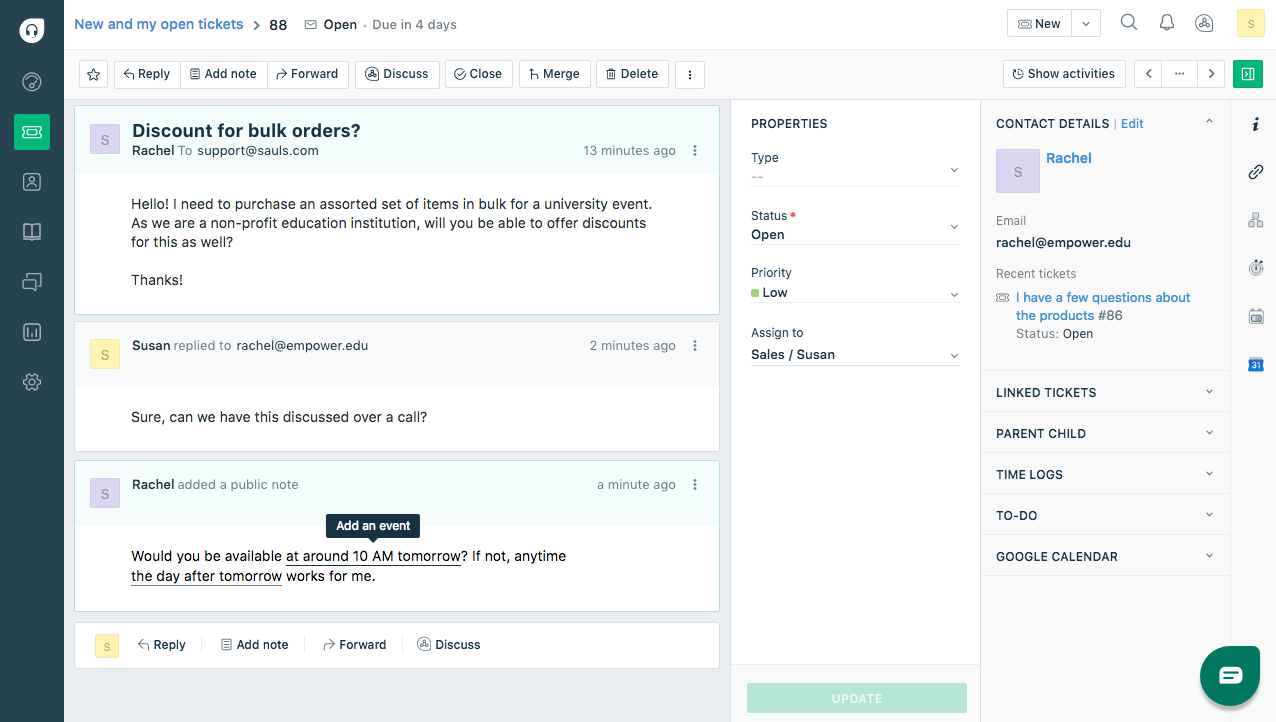
Image Source: Freshdesk
Over time, I’ve noticed that customers have varying preferences when reaching out for support, and Freshdesk has excelled in catering to these needs. It serves as an omnichannel solution tailored to the requirements of small to mid-sized businesses. I used the tool to engage with customers across various channels like email, phone, live chat, social media, etc.
Freshdesk’s automation features are exceptional. Tasks like ticket routing, prioritization, and even responses can be automated, freeing up my time for more complex issues. The Freddy AI chatbot is impressively efficient at handling common queries and resolving simple issues, freeing up your team to focus on more complex requests.
However, I wasn’t particularly impressed with its customer support team. They took longer than expected to address my ticket, which led to a less-than-ideal experience.
What You’ll Like:
- Canned responses to share consistent replies to customer emails
- Live chat to offer instant assistance to visitors and existing customers
- SLA management to help you set deadlines for ticket response and resolution
- Automated alerts to keep support reps updated on ticket progress
What You Won’t Like:
- Many online reviews reveal that Freshdesk’s support team is slow to respond at times
- Attaching images to a help desk ticket can be time-consuming
Pricing:
- Starts at $15/user/month.
6. Zoho Desk – Best for Social Media Service
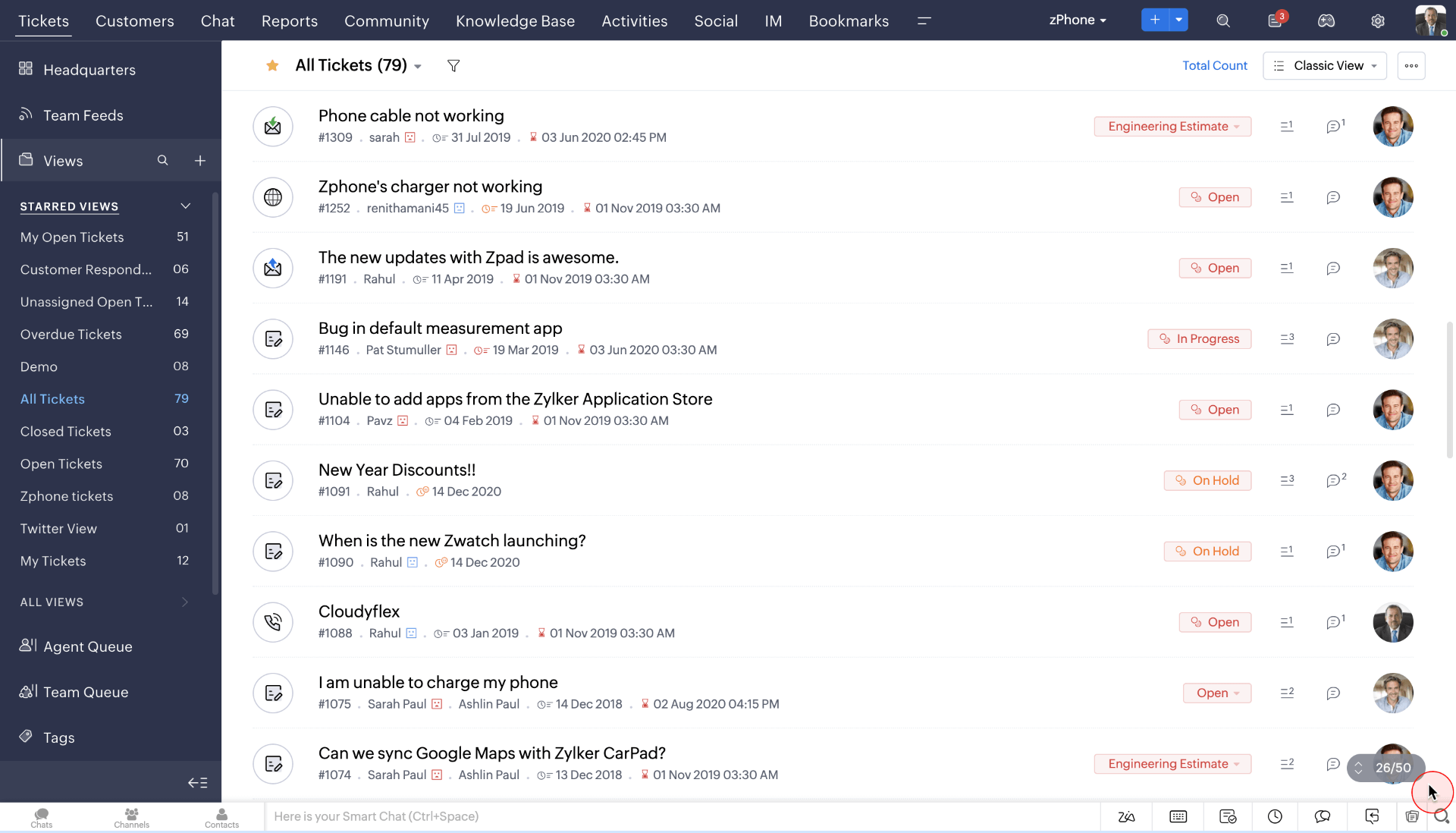
Image Source: Zoho Desk
Zoho Desk is a help desk software that streamlines customer support operations. While using Zoho Desk around a year back, I realized it seamlessly combined the leading social media platforms, including Facebook, Instagram, and Twitter, with our conventional customer support channels. This lets us manage calls, emails, and social media from one interface, boosting response times and efficiency.
I also found Zia, the AI assistant, particularly useful. It provides helpful suggestions for responses, automates tasks like tagging and routing tickets, and even analyzes customer sentiment to better understand their needs. This level of intelligence elevates the customer service experience.
And let’s not forget about its powerful automation capabilities, such as intelligent routing and escalation rules, that ensure timely resolution of customer issues. Also, the platform’s reporting and analytics tools offer insights into customer satisfaction and agent performance, helping optimize support strategies.
What You’ll Like:
- Custom fields to include additional information on tickets
- Multi-branded help centers to provide dedicated support for each of your brands
- Seamlessly integration with Zoho CRM to offer personalized assistance
- Time tracking to calculate the time spent on each conversation
What You Won’t Like:
- Some customization features can be overwhelming for new users
- The live chat feature is exclusively offered in the Enterprise Plan
Pricing:
- Starts at $14/user/month.
7. Azuredesk – Best for an Unlimited Mailbox
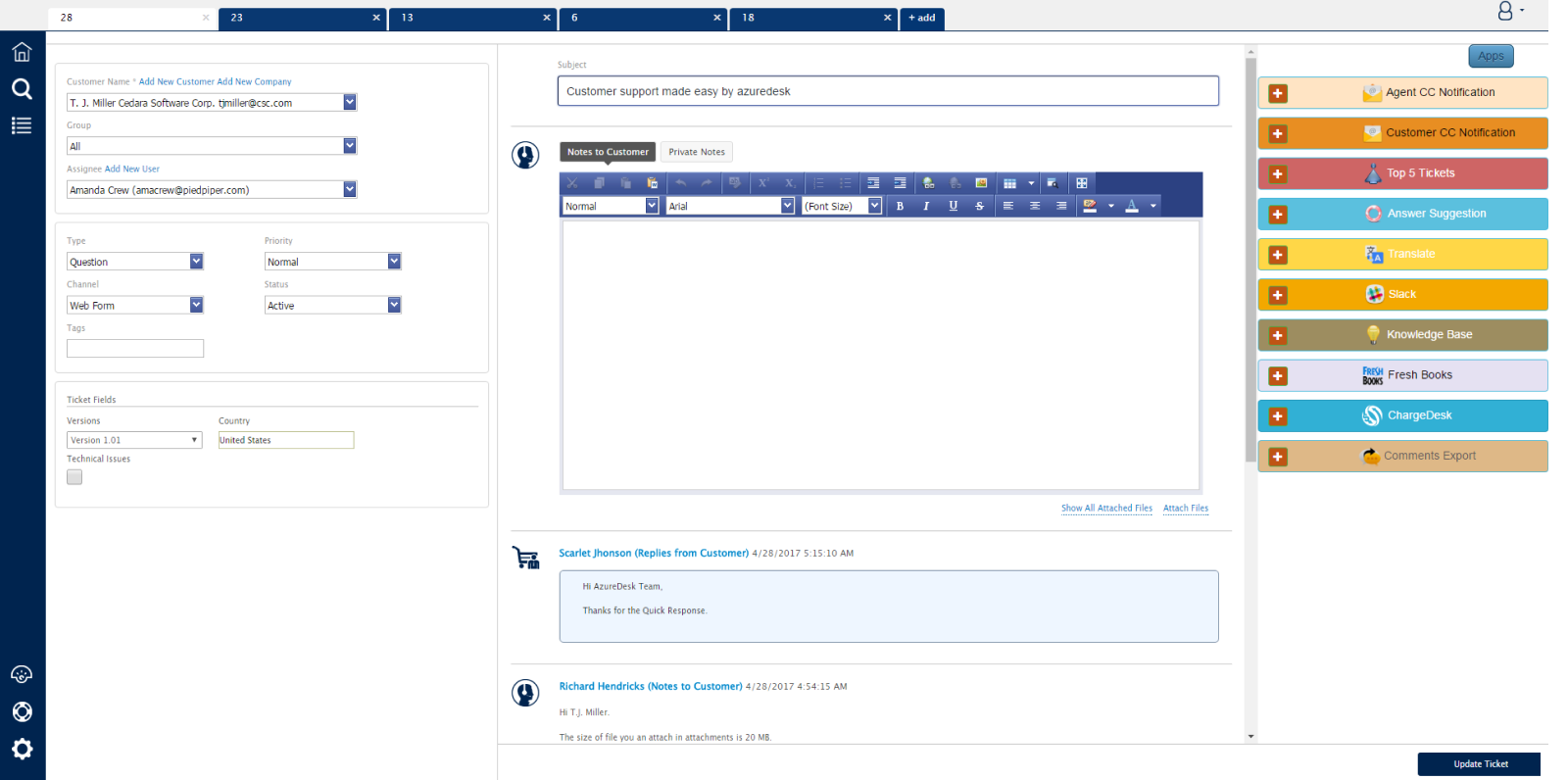
Image Source: AzureDesk
If your customer service primarily depends on email, you can try AzureDesk Ticketing System Software. You will be surprised to know that AzureDesk offers an unlimited mailbox, which can encompass all your support-related email accounts in one place.
One of the things I appreciate most about AzureDesk is its clean and intuitive interface. I also like how the platform made it easier for my agents to communicate with customers in over 50+ languages. They could quickly translate responses or detect a customer’s language.
A limitation of AzureDesk is its small selection of third-party integrations, which might hinder your ability to connect with some essential business tools.
What You’ll Like:
- Customer portal to allow customers to track their requests independently
- Agent signatures to help your team share professional email replies
- Unlimited mailbox to cater to growing support demands
- Ticket tags to easily search and locate the tickets you need
What You Won’t Like:
- Integration options are limited to just a few tools
- There is no feature to build custom chatbots
Pricing:
- Starts at $33/user/month.
8. Vision Helpdesk – Best for Mobile Application
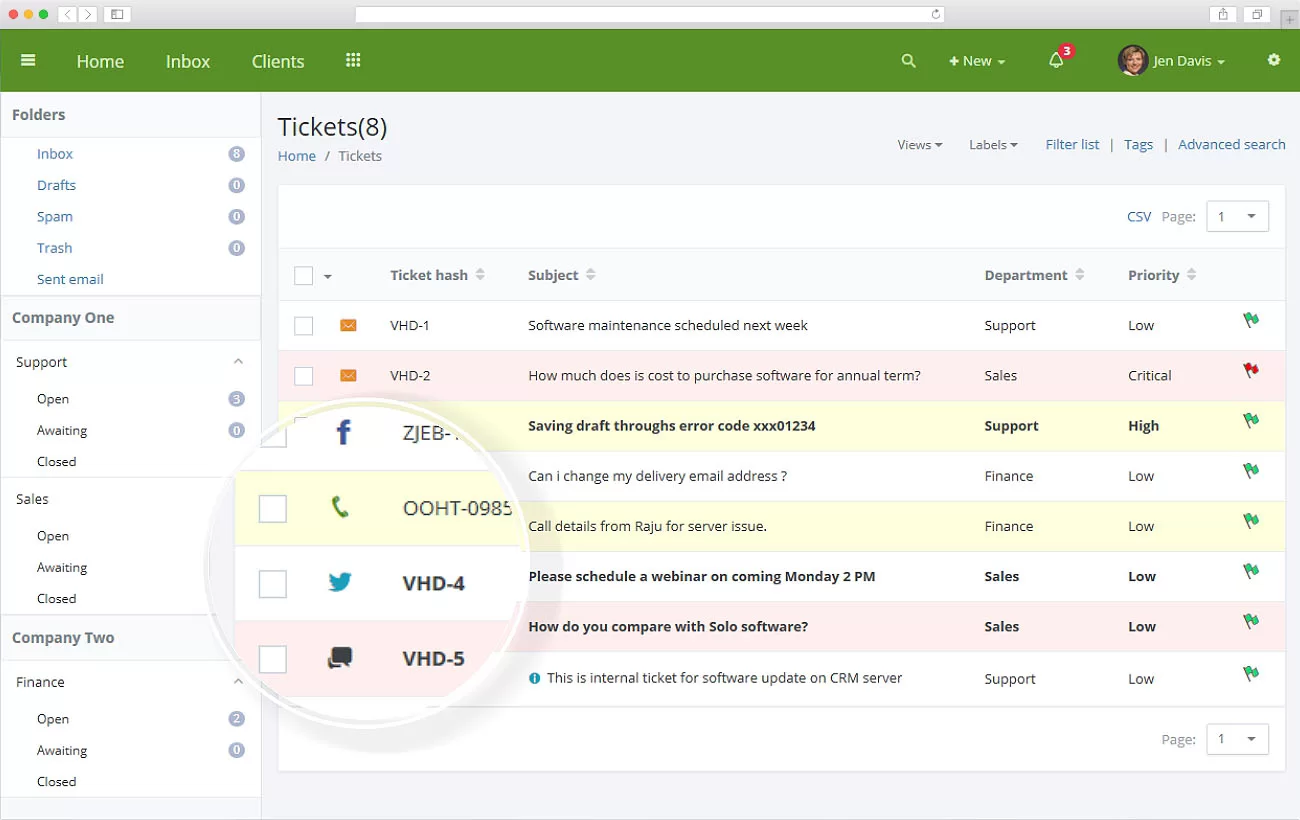
Image Source: Vision Helpdesk
Vision Helpdesk is a powerful and versatile help desk software that has truly impressed me with its comprehensive features and flexibility. It offers a wide range of functionalities, including multi-channel support, asset management, and a self-service knowledge base. I’m quite intrigued by its mobile applications built for different platforms – Android, iOS, and even Windows.
The native mobile apps from Vision Helpdesk will enable your support agents to access and resolve tickets while on the go. Plus, with features like IP restrictions, two-factor authentication, and GDPR compliance, you can be confident that your customer data is protected.
I’m sure you will like the time-tracking feature. Plus, with accurate time-based entries, you calculate the total time spent resolving issues and charge your customers accordingly.
What You’ll Like:
- SLA management to offer consistent quality service to customers
- Automated ticket escalations for timely issue resolution
- Custom email notifications to keep agents and customers updated
- Ticket auto close to automatically close tickets when there is no response from the customer
What You Won’t Like:
- Vision Helpdesk comes with a steep learning curve
- While there are some options, it’s not that simple to integrate it with other platforms
Pricing:
- Starts at $12/user/month.
9. TeamSupport – Best B2B Ticketing System Software
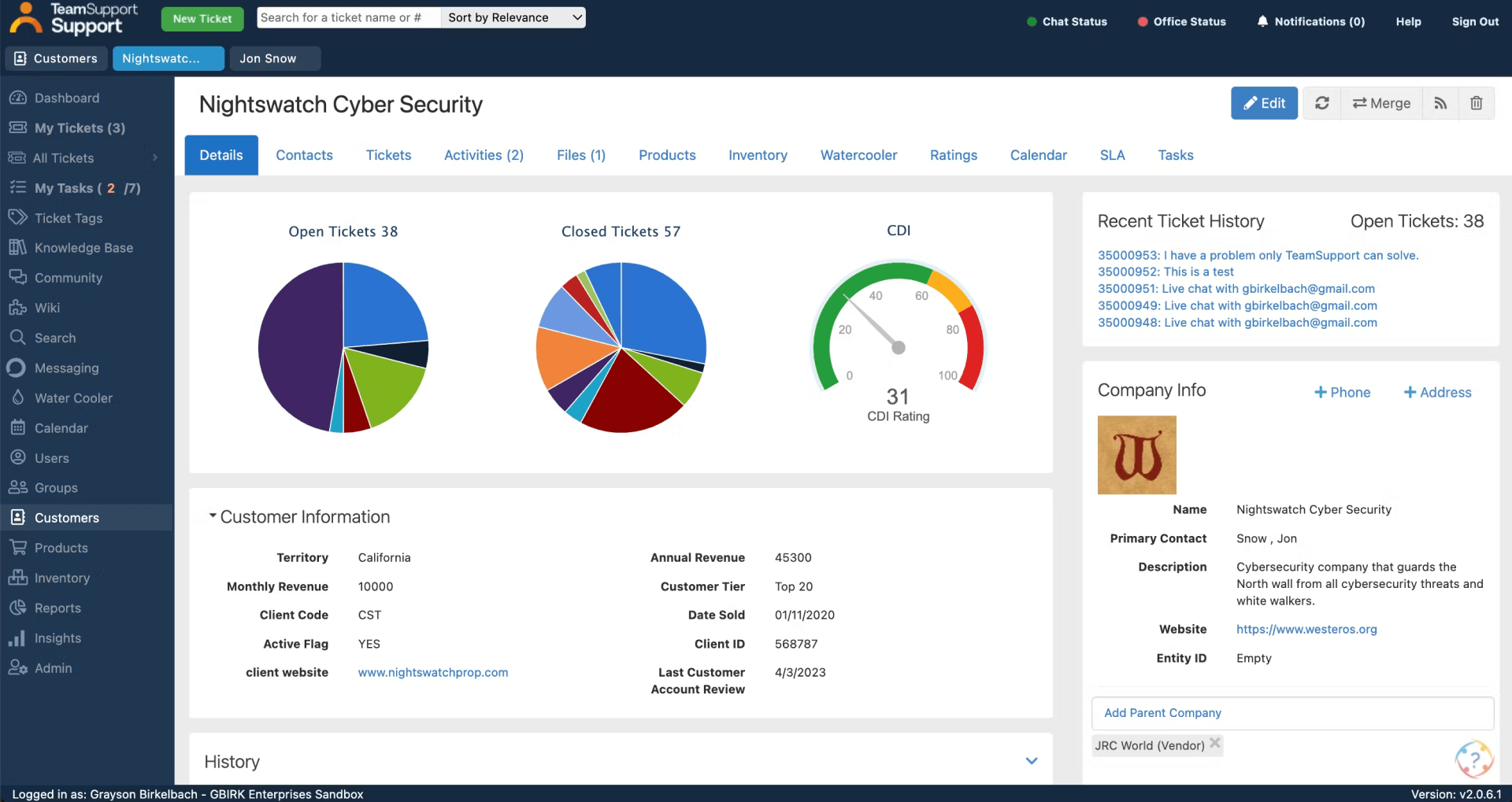
Image Source: Software Advice
For B2B enterprises, losing even one client can mean a significant financial setback. After using TeamSupport, I’ve found it uniquely suited to the specific needs of B2B firms.
The platform’s B2B ticketing system is its best feature, hands down. It allows me to track and manage customer interactions across different companies and departments, ensuring nothing falls through the cracks. This granular level of organization is invaluable for providing top-notch support to our clients.
Also, the platform offers a comprehensive set of features, including a knowledge base, customer self-service portal, and integrated live chat. I found the workflow automation tools particularly helpful in streamlining my support processes and saving valuable time.
What You’ll Like:
- Seamless integration with in-house CRM and other developer tools
- Ticket reminders to help agents avoid sharing late responses with customers
- Monitor Customer Distress Index (CDI) to minimize churn
- Shared calendars to help team members view task assignments and dependencies
What You Won’t Like:
- The agent collision feature is slow to work at times, leading to duplicate responses
- More designs for the live chat widget should be available for enhanced branding and customization
Pricing:
- Starts at $29/user/month.
10. Deskpro – Best for On-Premise Deployment
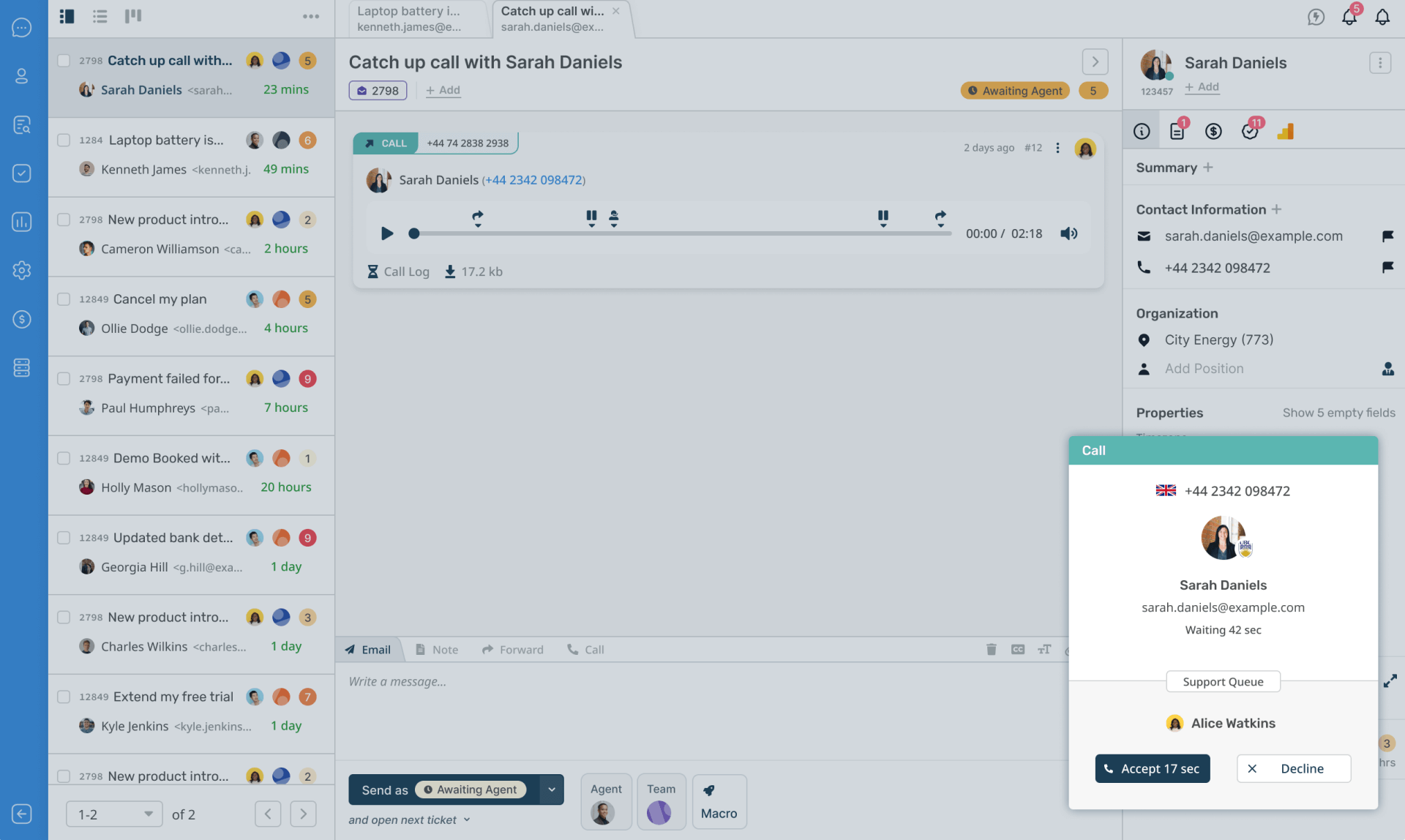
Image Source: Software Advice
Deskpro is a comprehensive platform that handles all support channels, from email and live chat to social media and phone, in one central location. The platform’s intuitive interface and extensive customization options make it a joy to use.
But the best part? Deskpro offers unparalleled flexibility with its on-premise deployment option. I had the opportunity to use Deskpro’s on-premise version in my last organization, which happened to be a Fortune 500 company, and it proved invaluable for data control and security.
Deskpro also offers excellent reporting and analytics. You easily track key metrics like response times, resolution rates, and customer satisfaction scores. This data is invaluable for identifying areas where we excel and areas where we need to improve our support processes.
What You’ll Like:
- Omnichannel support to manage all interactions seamlessly
- Automated call distribution to specific agents and departments
- Custom ticket filters to keep your help desk inbox clutter-free
- Drag-and-drop file attachments to support tickets
What You Won’t Like:
- There is no feature to build your own chatbot
- You will have to pay a high one-time fee for the on-premise version
Pricing:
- The cloud version starts at $29/user/month. Custom pricing is offered for the on-premise version.
11. Help Scout – Best for Live Chat Support
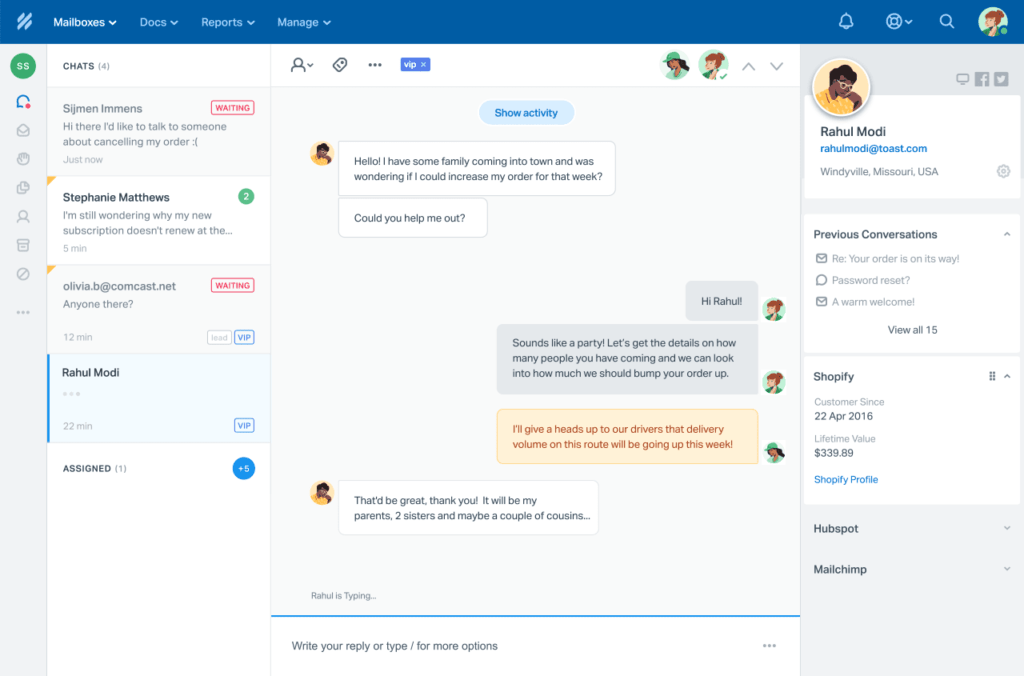
Image Source: Help Scout
Help Scout has been an absolute lifesaver for our customer support team. It’s more than just a ticketing system; it’s a platform designed to build genuine customer relationships. A standout feature for me is the shared inbox. It’s well-organized and makes collaboration effortless.
Help Scout’s seamless live chat support enables instant assistance to website visitors. With features like proactive chat and real-time monitoring, we can engage customers at the right moment and guide them to solutions.
Help Scout also offers a fantastic knowledge base feature. We’ve been able to create a comprehensive library of helpful articles and FAQs, empowering our customers to find answers on their own. This reduces ticket volume and allows us to focus on more complex issues.
What You’ll Like:
- Tags to categorize tickets or trigger automation
- Saved replies or canned responses to help reduce response times
- Custom fields to add custom data for tickets
- Help Scout’s Android and iOS mobile apps to offer support on the go
What You Won’t Like:
- The standard plan is limited to just two shared inboxes
- The platform does not offer a chatbot feature
Pricing:
- Starts at $22/user/month.
12. LiveAgent – Best for Ticket Management
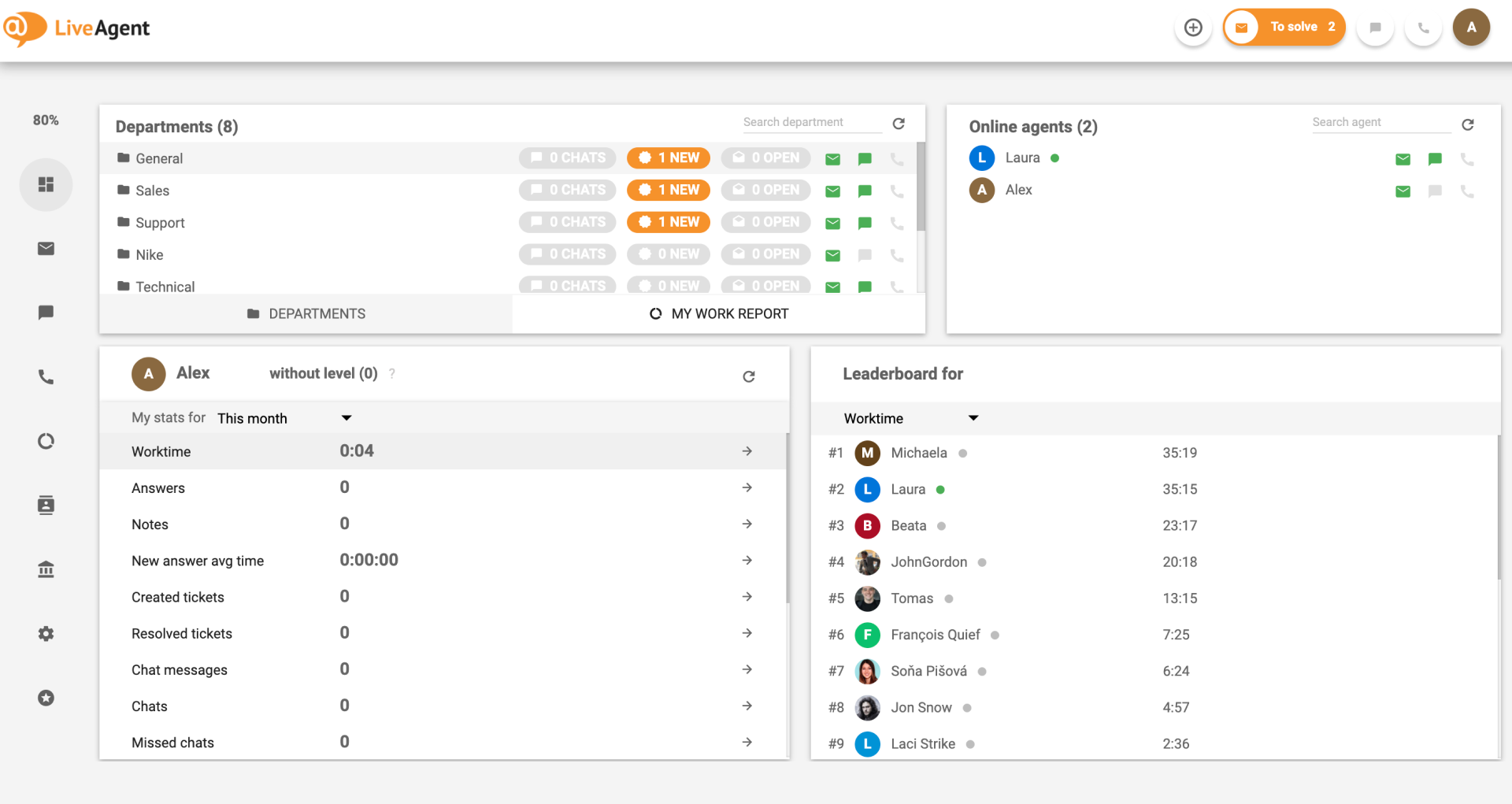
Image Source: LiveAgent
I used LiveAgent as my go-to help desk solution, and it came equipped with a variety of customer communication and organizational tools, such as live chat and a ticket management system.
What impressed me most about LiveAgent is its exceptional ticket management system. It’s incredibly organized and efficient, allowing you to track, prioritize, and resolve customer issues with ease. Features like automated ticket routing and escalation ensure that no query goes unnoticed and every customer receives timely assistance.
LiveAgent also offers a comprehensive set of tools to boost agent productivity. Features like canned responses, pre-defined rules, and time tracking helped our team work smarter, not harder. It’s the perfect solution for businesses looking to optimize their customer support workflow and deliver exceptional service.
What You’ll Like:
- Canned responses to save your agents from the pain of typing similar responses
- Built-in contact forms to gather the right information
- Agents can perform mass actions on tickets for faster issue resolution
- The real-time typing-view to help you see what customers are typing
What You Won’t Like:
- The small business plan is limited to just 3 email accounts
- The platform misses out on some important reporting and analytics features
Pricing:
- Starts at $9/user/month.
What Is Help Desk Software Used For?
Help desk software is designed to streamline customer support operations by providing a centralized platform for managing and resolving customer inquiries and issues. Here are six practical uses for help desk software:
1. Ticket Management and Tracking
Help desk software enables the creation, tracking, and management of support tickets. Each customer inquiry is converted into a ticket, which can be categorized, assigned to the right team member, and tracked from initiation to resolution.
This ensures no issue is overlooked, helping support teams stay organized and prioritize critical problems. It also provides a history of past interactions, making follow-up support more efficient.
2. Centralized Communication Hub
With help desk software, businesses can consolidate all customer communication from various channels (email, live chat, social media, and phone calls) into one centralized platform. This reduces the risk of missing customer inquiries and allows support teams to respond quickly and consistently, regardless of the communication method.
A unified interface enhances team collaboration and ensures a more streamlined customer service experience.
3. Knowledge Base and Self-Service Support
A self-service knowledge base is essential to help desk software, allowing customers to find answers to common issues independently. It reduces the volume of inbound support tickets by offering easily accessible FAQs, guides, troubleshooting steps, and product documentation.
This not only empowers customers but also frees up agents to focus on more complex support needs.
4. Automation of Repetitive Tasks
Help desk software includes automation features that streamline repetitive processes, such as ticket routing and follow-up reminders. These automated workflows ensure that tickets are directed to the right agents promptly, reducing manual errors and response times.
Automation also triggers timely notifications for agents and customers, ensuring that key stakeholders are always up to date.
5. Reporting and Analytics
Real-time reporting and analytics tools provide insights into team performance, customer satisfaction, and service efficiency. These metrics help businesses track key performance indicators (KPIs), identify trends, and evaluate support team effectiveness.
By analyzing data such as response times, ticket resolution rates, and customer feedback, businesses can continuously improve their support processes and optimize resource allocation.
6. Collaboration Features for Support Teams
Help desk software includes collaboration tools that enable team members to work together on complex tickets. Features like internal ticket notes, shared ticket visibility, and real-time chat allow agents to discuss and resolve issues collectively.
Collaboration ensures faster problem resolution, as multiple team members can contribute their expertise, leading to better customer outcomes and more efficient ticket management.
What Are the Key Benefits of Help Desk Software?
Help desk software offers a wide range of benefits that help businesses improve service quality, streamline operations, and enhance efficiency. Here are six unique and practical benefits:
1. Greater Customer Satisfaction
Help desk software ensures that customer inquiries are addressed promptly and professionally, offering a seamless experience. Features like automatic ticket assignment, fast response times, and prioritization ensure that customer issues are resolved quickly, leading to higher satisfaction rates.
The ability to track ticket progress also helps customers stay informed about the status of their queries, fostering trust and a positive brand image.
2. Increased Productivity
With help desk software, support teams can handle multiple customer inquiries simultaneously. Automation tools such as ticket routing, canned responses, and knowledge base access allow agents to resolve simple queries quickly and efficiently.
This frees up time for more complex issues, ultimately improving the entire team’s productivity. The software’s ability to manage multiple support channels in one place also reduces the time spent switching between platforms.
3. Better Issue Resolution Tracking
Help desk software tracks the entire lifecycle of each support ticket, providing transparency and accountability. Support teams can see exactly where each issue is in the resolution process, ensuring every ticket is recognized and addressed.
This end-to-end tracking allows businesses to monitor progress, set resolution timelines, and improve workflows. Additionally, tracking recurring issues helps identify common problems, leading to proactive measures and faster resolutions in the future.
4. Cost Savings
Help desk software offers a more efficient way to manage support queries, ultimately leading to cost savings for businesses. By automating routine tasks like ticket assignment, follow-up emails, and customer responses, businesses can reduce the need for a large support team.
Additionally, features like a self-service portal allow customers to resolve simple issues themselves, reducing the number of calls or messages that require human intervention. These efficiencies reduce operational costs while maintaining high-quality customer service.
5. Improved Collaboration
Help desk software encourages collaboration within support teams, enabling agents to work together on complex issues. The software allows for easy ticket sharing, collaboration on unresolved queries, and internal notes on customer issues.
This helps ensure that the right person with expertise handles each ticket. Furthermore, by enabling teams to work together more efficiently, help desk software can shorten resolution times, leading to quicker problem-solving and a better customer experience.
6. Data-Driven Insights
Help desk software provides businesses with detailed analytics and reporting tools that offer valuable insights into customer satisfaction, support team performance, and common customer issues. These data-driven insights help businesses identify areas where support processes can be improved, measure response times, and track overall customer satisfaction levels.
By using this information, businesses can make informed decisions about training needs, support strategies, and process optimizations, ultimately enhancing the customer experience and increasing operational efficiency.
What Are Some Essential Help Desk Software Features?
Essential help desk management software features streamline support operations, enhance team productivity, and improve customer satisfaction. Here are some key features that make a help desk truly effective:
1. Multi-Channel Support
One of the most valuable features of help desk software is its ability to integrate multiple communication channels into a single platform. This includes support for email, live chat, social media, phone calls, and even SMS. By consolidating all customer interactions into one interface, support teams can streamline communication and respond promptly, regardless of the contact channel.
This feature not only enhances the customer experience but also ensures no inquiry is missed, improving overall efficiency and customer satisfaction.
2. Ticket Routing and Prioritization
Help desk software often includes advanced ticket routing and prioritization tools, which are essential for managing a high volume of support requests. With intelligent ticket routing, the software automatically assigns tickets to the appropriate support agents based on factors like the issue type, the agent’s skill set, or availability.
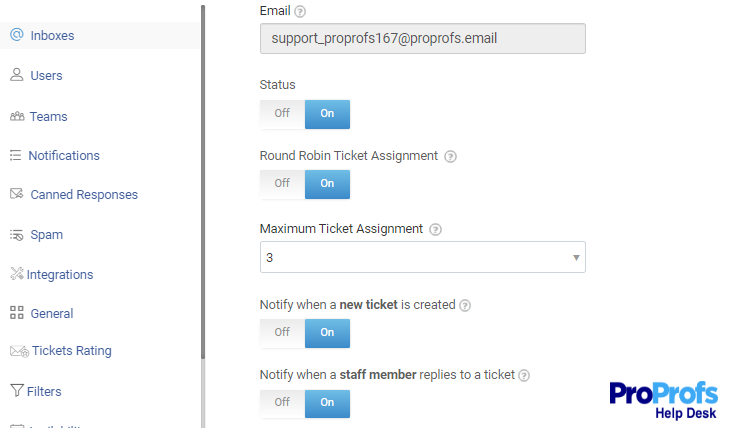
Prioritization rules ensure that critical or urgent issues are addressed first, helping to reduce customer wait times and improving the resolution rate. This automated process helps organizations deliver more effective and timely support while minimizing human errors in ticket assignment.
3. Knowledge Base and Self-Service Portal
A robust knowledge base is an essential feature of help desk software, enabling businesses to provide customers with access to a wide range of self-help resources, such as FAQs, how-to guides, troubleshooting tips, and product documentation.
This feature allows customers to independently find solutions, reducing support requests and providing immediate assistance anytime. A self-service portal lets users quickly find answers, boosting customer satisfaction and allowing support teams to focus on more complex issues.
4. Automation and Workflow Management
Automation tools within help desk software save valuable time and reduce the risk of human error by automating repetitive tasks such as ticket categorization, assigning tickets to agents, and sending acknowledgment emails to customers.
With workflow management features, businesses can define and enforce a standardized process for handling customer issues, ensuring that tickets follow a consistent path from initiation to resolution. These automation features improve efficiency, reduce manual intervention, and allow agents to focus their energy on more complex and high-priority tickets.
5. Real-Time Analytics and Reporting
Help desk software comes equipped with powerful analytics and reporting tools that provide real-time insights into various support metrics, such as ticket volume, response times, customer satisfaction scores, and agent performance. Managers can use these data points to track the effectiveness of their support operations, identify trends, and pinpoint areas that require improvement.
Customizable reports allow businesses to focus on specific metrics relevant to their goals, whether that be reducing ticket resolution time or improving agent productivity. With data-driven insights, businesses can continuously optimize their support processes for better results.
6. Collaboration Tools
Effective collaboration among support agents is crucial for resolving complex issues quickly and efficiently. Help desk software typically includes collaboration tools that enable agents to communicate with each other directly within the platform. These tools include internal ticket notes, shared ticket visibility, and team chat for discussing unresolved issues and sharing insights.
Collaboration features ensure that support teams can work together seamlessly, leading to faster ticket resolutions and ensuring that customers get the most accurate, well-rounded support possible. By breaking down silos, collaboration tools also promote a more cohesive team environment.
What Are Three Types of Help Desk Software?
Help desk support software comes in various forms to suit different organizational needs and support structures. Here are three common types of help desk software:
1. Cloud-Based Help Desk Software
Cloud-based help desk software is hosted on the cloud and accessed through the internet, allowing businesses to access it remotely from anywhere. Such tools offer high scalability, as businesses can easily adjust their plans and storage capacity as needed.
They are also cost-effective, eliminating the need for expensive infrastructure and maintenance. With automatic updates, security features, and cloud tool integrations, this option is perfect for remote teams seeking flexibility and ease of use.
2. On-Premise Help Desk Software:
On-premise help desk software is installed and operated on a company’s own servers, offering more control over data security and customization. While it provides a high level of security and the ability to customize the software to fit specific needs, it also requires significant investment in hardware, infrastructure, and a dedicated IT team for maintenance.
On-premise solutions are best suited for large businesses or those with specific regulatory or security requirements that necessitate full control over their support systems.
3. Hybrid Help Desk Software
Hybrid solutions combine the best features of both cloud-based and on-premise software. With hybrid help desk software, companies can store some data on-site while leveraging cloud capabilities for other functions, providing flexibility and scalability.
This type of software allows businesses to balance the advantages of cloud accessibility with the security and control offered by on-premise solutions. Hybrid models are well-suited for organizations that require customization and data privacy but also want to benefit from the cloud’s scalability and remote access.
How to Implement Help Desk Software in Your Organization
Implementing support desk software in your organization requires careful planning and execution to ensure it meets your business needs. Here’s a step-by-step guide to help you integrate the software and maximize its effectiveness.
1. Assess Business Needs
Before selecting help desk software, conduct an assessment to understand your team’s unique needs. Consider factors like the size of your support team, the volume of customer inquiries, and the channels through which customers contact your support team (email, chat, social media, etc.).
Identifying these requirements early will ensure that the chosen software aligns with your organizational goals and processes.
2. Set Clear Objectives
Define the specific goals you want to achieve by implementing help desk software. For example, you may want to reduce response times, improve customer satisfaction, or streamline ticket management. Clear objectives will guide the configuration and use of the software, ensuring it delivers the desired results.
Establishing measurable KPIs (Key Performance Indicators) will help track progress and effectiveness over time.
3. Choose the Right Plan
Evaluate different pricing plans offered by the software vendors, ensuring that the features and support levels offered fit within your budget. Some software may have tiered plans with varying feature sets, so choose a plan that provides the right tools for your team without overpaying for unnecessary features.
It’s also helpful to check if the software offers a free trial or a demo version so you can evaluate it before making a decision.
4. Integrate with Existing Tools
Help desk software should integrate smoothly with the tools you’re already using, such as your CRM, email platform, live chat software, or social media accounts. Integration ensures that all customer interactions and data are in one place, making it easier to manage tickets and track customer histories. Strong integration capabilities also reduce data silos and improve workflow efficiency.
5. Train Your Team
Comprehensive training is key to successful software adoption. Organize training sessions for your support staff to familiarize them with the software’s features, such as ticket management, customer communication, and reporting tools.
Ensure that staff understands the software’s interface, workflows, and best practices for efficient ticket handling. Offering ongoing support and refresher training will keep the team updated on any new features or changes.
6. Customize for Your Workflow
Every business has unique workflows, and the help desk software should be customized to fit your organization’s processes. Set up customized ticket categories, status labels, and automated workflows based on your team’s specific needs.
For example, you may want to assign priority levels to tickets or route certain issues to specific departments. Customization allows your team to work more efficiently and ensures that the software meets your operational requirements.
7. Set Up Automation
One of the biggest advantages of help desk software is its automation capabilities. Set up automated ticket routing, status updates, and follow-up reminders to save time and reduce manual workload. You can also automate responses for frequently asked questions or basic inquiries.
Automation will help streamline repetitive tasks, allowing your support team to focus on more complex issues and ensuring customers receive timely updates.
8. Monitor Performance
Regularly monitor key performance metrics to evaluate the effectiveness of the help desk software. Metrics like average response time, ticket resolution time, customer satisfaction scores, and ticket volume will provide insights into how well the system is working.
Use these metrics to identify areas for improvement, adjust workflows, and optimize the use of the software. Many help desk systems come with built-in analytics tools to track these performance indicators.
9. Encourage Customer Self-Service
Create a knowledge base or FAQ section within the help desk software to empower customers to find answers to common questions on their own. By offering self-service options, you can reduce the number of incoming tickets and allow your support team to focus on more complex inquiries.
Ensure that the knowledge base is regularly updated and easily navigable for customers to quickly find solutions to their issues.
10. Gather Feedback
After implementation, continuously gather feedback from both your customers and the support team. For customers, this could include surveys after each ticket resolution to measure their satisfaction with the support received. For your team, solicit input on how the software is working, any challenges they face, and suggestions for improvement.
Regular feedback helps identify areas where the software can be further optimized or new features can be implemented, ensuring that it continues to meet both customer and team needs.
What Are the Common Challenges With Help Desk Software?
While help desk software offers numerous benefits, businesses often encounter challenges during implementation and use. Here are some of the most common hurdles businesses face with help desk tracking software:
1. Complexity in Setup
Many help desk software tools come with intricate setups and configurations that can be time-consuming and confusing, especially for businesses with limited technical expertise. The complexity can lead to a prolonged onboarding process, which delays the team’s ability to provide efficient support.
2. Integration Issues
A significant challenge arises when help desk software struggles to integrate with other critical systems such as CRMs, email platforms, or third-party communication tools. Without seamless integration, businesses face workflow disruptions, data silos, and additional manual work to sync information across platforms, which reduces efficiency.
3. Limited Customization
While some help desk tools offer predefined templates and workflows, they may not allow the level of customization necessary to align with unique business requirements. This can be frustrating for businesses looking to personalize the tool’s interface, ticketing system, or workflows to match their branding, processes, or customer preferences.
4. Overwhelming Features
Many help desk platforms come with a broad range of features, which can be overwhelming for smaller teams or businesses just getting started. With so many tools available, businesses often struggle to identify the most important features and end up underutilizing the software or wasting time learning functions that aren’t immediately relevant.
5. Scalability Concerns
As a business grows, so does the volume of customer support inquiries. Help desk software may face challenges in scaling to meet the increasing demand. This includes handling a higher volume of support tickets, accommodating more team members, or expanding the range of support channels without sacrificing performance or user experience.
6. Performance and Downtime
Frequent system outages, slow loading times, or poor response rates can hinder the ability to provide fast and effective customer support. Performance issues like these lead to longer response times, frustrated customers, and decreased customer satisfaction, which can damage the company’s reputation.
7. Cost of Upgrades
Many help desk solutions come with hidden costs, including additional fees for premium features, upgrades, or user licenses. As businesses scale or require more advanced functionalities, the costs of maintaining and upgrading the system can quickly add up. This can make it difficult for companies to predict and control their software expenses.
What Are the Future Trends in Help Desk Software?
With technological advancements, help desk software is evolving to better address the needs of businesses and customers. Here are some key future trends to watch in help desk software:
1. AI and Automation Integration
The future of help desk software lies in enhanced AI and automation. Expect chatbots to handle routine inquiries, ticket triaging, and customer follow-ups, reducing manual workload. AI can also predict customer issues based on past interactions, providing faster resolutions.
Automation will extend to ticket routing, ensuring the right agent addresses specific queries, improving response times and customer satisfaction. This trend will allow teams to focus on more complex, high-value tasks. Over time, this automation will only become more intelligent and efficient, adapting to customer needs.
2. Omnichannel Support
The need for omnichannel support is rising as customers expect seamless interactions across various platforms—social media, email, phone, live chat, and self-service portals. Future help desk software will integrate all communication channels into one unified interface, allowing agents to view a complete customer journey.
This holistic view will help agents provide more personalized and timely responses. By offering a consistent experience across channels, businesses can increase customer satisfaction and loyalty.
3. Self-Service and Knowledge Base Expansion
With customers increasingly preferring self-service, help desk software will further enhance knowledge base capabilities. These platforms will evolve into interactive, AI-driven resources, providing personalized recommendations based on previous interactions or preferences.
Future systems will incorporate video tutorials, user guides, and community forums, enabling customers to troubleshoot and find solutions on their own. As more users turn to self-service for quick resolutions, businesses will benefit from reduced ticket volumes, allowing support teams to focus on more complex issues.
4. Proactive Customer Support
Future help desk software will focus on proactively identifying issues before customers encounter them. Using predictive analytics, these tools will flag potential problems based on patterns in previous data.
For instance, a software system could notify customers about potential service outages or offer assistance when it detects that a user is struggling with a product feature. By reaching out before issues escalate, businesses can prevent frustration and enhance the customer experience.
5. Enhanced Collaboration Features for Remote Teams
As remote and hybrid work environments continue to thrive, help desk software will incorporate advanced collaboration tools. Expect features like shared inboxes, internal knowledge-sharing systems, and real-time chat functionalities to improve team communication.
Integration with project management tools and internal ticketing systems will streamline workflows, allowing remote agents to collaborate efficiently, even across time zones. This trend will enable faster, more efficient issue resolution, regardless of agents’ locations.
6. Advanced Reporting and Analytics
The future of help desk software will involve more sophisticated reporting and analytics capabilities. Businesses will have access to detailed insights into customer satisfaction, ticket trends, agent performance, and more. These insights will enable data-driven decision-making, allowing companies to identify problem areas and optimize their support processes.
Advanced AI-driven analytics will also help predict customer behavior and sentiment, empowering teams to take action before problems arise. These capabilities help businesses refine support strategies, boost efficiency, and provide personalized customer experiences.
Evaluation Criteria
The selected helpdesk software tools are evaluated based on various factors to ensure they effectively meet the needs of businesses. Here are the key evaluation criteria used in the assessment:
- Ease of Use: How user-friendly and intuitive is the software for both agents and customers? A seamless experience is crucial for efficient support management.
- Feature Set: Does the software provide essential tools like ticket management, live chat, knowledge base, and automation features? A robust feature set ensures comprehensive support capabilities.
- Customization Options: How easily can the tool be tailored to fit the specific needs and branding of your business? Customizability ensures a more personalized customer experience.
- Integration Capabilities: Does the software integrate smoothly with other business systems like CRM, email, and social media platforms? Strong integrations enhance workflow and productivity.
- Customer Support: What level of support is offered by the tool provider? Reliable customer support ensures quick resolution of issues and a smoother user experience.
- Pricing: Is the software pricing transparent and cost-effective for businesses of all sizes? Competitive pricing and value for money are essential for choosing the right solution.
Offer Delightful Customer Support With the Best Help Desk Software!
The best help desk software can supercharge your support operations—improving efficiency, resolving issues faster, and delighting customers. With a variety of helpdesk tools suited to different needs and budgets, finding the perfect fit is key.
If you’re looking for a help desk software that’s both intuitive and AI ready, I highly recommend ProProfs Help Desk. It perfectly blends user-friendly design with advanced AI features like customer intent analysis and response suggestions.
Still unsure? Take a free trial or demo of the tool that checks all your boxes. Got more questions? Feel free to go through our interesting FAQ section below.
Frequently Asked Questions
How to Choose the Right Ticketing Workflow?
When choosing the right ticketing workflow, consider your team's size, the complexity of issues, and the preferred communication channels. Look for a system that allows for easy ticket categorization, automated routing, and status tracking to streamline the process and enhance customer service.
How Are Chatbots Used for Customer Service?
Chatbots are used in customer service to automate responses to common inquiries, provide instant assistance, and route complex issues to human agents. They improve efficiency by handling high volumes of queries and offering 24/7 support, allowing teams to focus on more intricate problems.
Difference Between Help Desk Software & Ticketing System Software?
Help desk software offers a comprehensive solution that includes ticketing, live chat, knowledge base management, and other support tools. A ticketing system, on the other hand, focuses specifically on tracking, managing, and resolving customer issues through tickets, often with limited functionality beyond that.
How Does Help Desk Software Enhance Customer Satisfaction?
Help desk software enhances customer satisfaction by providing faster response times, better ticket management, and more efficient resolution of issues. It enables multi-channel support, self-service options, and personalized interactions, improving the overall customer experience.
Who Manages a Help Desk?
A help desk is typically managed by a team of customer support agents, with a lead or supervisor overseeing operations. In larger organizations, dedicated help desk managers are responsible for ensuring that tickets are resolved efficiently and that the team meets service-level agreements.
FREE. All Features. FOREVER!
Try our Forever FREE account with all premium features!








